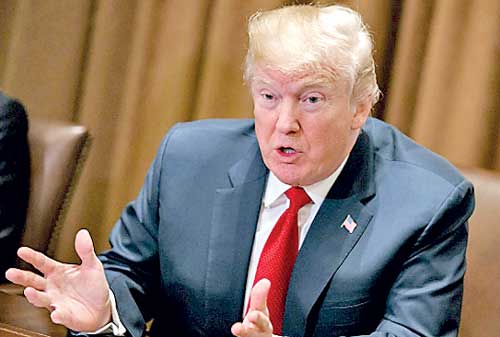Wednesday Feb 18, 2026
Wednesday Feb 18, 2026
Thursday, 8 February 2018 00:00 - - {{hitsCtrl.values.hits}}
WASHINGTON (Reuters): The US House of Repre-sentatives on Tuesday approved another stopgap bill to keep the federal government from shutting down, hours after President Donald Trump said he would “love” to see a shutdown if immigration legislation were not included.
In a further sign of the Republican-controlled Congress’ inability to get its most basic work done, the House in a 245-182 vote passed and sent to the Senate a temporary spending bill to extend most agency funding until March 23.
It was the fifth such stopgap of the federal fiscal year, which began Oct. 1. Stopgaps are needed when Congress fails to approve a full budget on time by that date. Congress has managed to pass its spending bills on time in only four of the past 40 years, according to congressional researchers.
The Senate was expected to take up the House bill on Wednesday and likely change it, requiring it to go back to the House for further action, with a Thursday deadline looming to get a finished bill to Trump for his signature. As a result of the time crunch, Democrats cancelled a retreat to Maryland’s Eastern Shore that they had planned for Wednesday to Friday and said they would talk strategy in the US Capitol instead. The House bill does not contain changes to US immigration law, which were a key point of contention in a partisan standoff that led to a three-day partial shutdown last month.
Senate Democrats were expected to balk at the House’s bill’s inclusion of an increase in Pentagon funding through Sept. 30, the end of the current fiscal year, but exclusion of any increase in non-defence spending.
Republicans and Democrats said they were making progress, however, on a budget deal that would set new, higher spending limits for defence and non-defence programs.
Last month’s shutdown came after lawmakers failed to reach agreement on contentious budget and immigration issues.
“I’d love to see a shutdown if we don’t get this stuff taken care of,” Trump said at the White House.
The White House later clarified that it did not expect the budget deal to include specifics on immigration.
A broad budget deal could end the brinkmanship over spending that roils Washington so regularly that financial markets barely flinch anymore at the threat of a government shutdown.